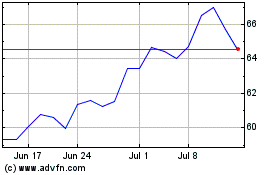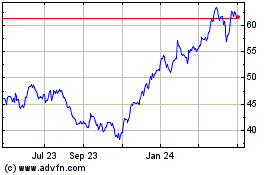Quarterly earnings are erased but stock rises as investors
expect measure to be boon
By Christina Rexrode
This article is being republished as part of our daily
reproduction of WSJ.com articles that also appeared in the U.S.
print edition of The Wall Street Journal (January 17, 2018).
The tax law wiped out Citigroup Inc.'s fourth-quarter earnings
and then some, with the bank taking a $22 billion charge that
caused it to post a loss of $18.3 billion -- its biggest loss ever
for a single quarter.
Investors looked past the immediate results to the near-term
future, when they expect the tax law will boost earnings for
Citigroup and other banks. Shares rose 0.4% to $77.11 on a day when
the market was down.
Citigroup Chief Executive Michael Corbat and Chief Financial
Officer John Gerspach were upbeat in calls with analysts and
reporters, saying the tax changes will bolster their future profits
and buoy their clients, echoing the sentiment last week of JPMorgan
Chase & Co. CEO James Dimon.
Specifically, Citigroup increased one of its key profitability
goals in response to the tax changes and said it was still on track
to return capital to shareholders according to a plan it laid out
in July.
Underneath the $22 billion tax charge, Citigroup turned in
results that beat analysts' expectations with higher revenue, more
lending and flat expenses.
Without the tax charge, the bank would have made $1.28 a share,
beating the $1.19 expected by analysts polled by Thomson Reuters.
With the tax charge, the loss amounted to $7.15 a share for the
fourth quarter alone and wiped out nearly six quarters of
profit.
Mr. Gerspach brushed off the tax-related loss as a temporary
bump in the road. "It's something we think we can quickly overcome
and it's not a headwind that causes us to alter any of our existing
plans," Mr. Gerspach said. The short-term pain, he said, is "a
pretty good trade-off."
Until now, the biggest quarterly loss at Citigroup was in the
depths of the financial crisis at the end of 2008. But that loss
had a different tone: The bank lost $17.3 billion as it took huge
write-downs on subprime mortgage securities and bad loans.
This time, the New York bank's loss comes from an accounting
maneuver forced by a favorable piece of legislation in Washington.
Citigroup already had warned Wall Street about the looming loss,
saying last month that it expected to take a hit of about $20
billion to profit this quarter.
The quarterly loss also is something of a cleansing for
Citigroup. The main reason for the tax charge is that the new tax
law forced the bank to write down the value of its huge pile of
deferred-tax assets. Those assets are essentially past losses that
Citigroup racked up during the financial crisis and which it can
use to defray future tax bills. The tax law, which slashes the
corporate tax rate to 21% from 35%, made those assets less
valuable.
But the deferred-tax assets also have been a shadow over
Citigroup's results for nearly the past decade, stoking investor
uncertainty. Mr. Corbat, who became CEO in 2012, has made working
through them a priority, though the progress had been slow. At the
end of the third quarter, they were about $45 billion, compared
with a peak of about $55 billion. Mr. Gerspach said Tuesday that he
expected the amount would fall to about $23 billion.
The tax law also damped the results of JPMorgan when it reported
last week and is expected to hurt other banks in the fourth quarter
as well. But Citigroup's bigger pile of deferred-tax assets means
it will be more deeply affected than the other banks, and its
tax-related charges are expected to be among the largest of any
U.S. company this quarter.
About $3 billion of the $22 billion charge came from the newly
enacted, one-time charge on U.S. companies' overseas earnings.
Citigroup is more focused on overseas markets than some of its
peers.
Aside from the tax noise, 2017 was a relatively quiet year for
Citigroup, missing some of the stumbles and scandals that had
plagued it in the past.
Mr. Corbat is focused on returning more capital to shareholders
and improving profitability metrics such as return on equity. While
there was no profit in the fourth quarter because of the tax
charge, on an adjusted basis, Citigroup said return on equity came
in at 6.5%.
Revenue rose to $17.26 billion from $17.01 billion a year
earlier. In trading, revenue fell 19% to $2.9 billion from $3.6
billion a year ago. That was in line with what Mr. Gerspach
predicted last month.
Equities-trading revenue fell 23%. The bank said it could lose
as much as $370 million on a single client. JPMorgan confirmed last
week that it had suffered a loss as high as $273 million on a
margin loan to Steinhoff International Holdings NV, a South African
retail company dealing with an accounting scandal. Mr. Gerspach
declined to comment in response to repeated questions about whether
the Citigroup loss also came from Steinhoff.
"There was a margin loan and some derivatives associated with
it," Mr. Gerspach said. "We needed to seize the margin and that
caused a credit event....It's pretty simple." Profit at the
institutional bank, which includes trading and investment banking,
fell 7%.
Quarterly profit at the consumer bank rose 9%, driven by the
Asia business. Citigroup has been investing heavily in its credit
card unit, including new rewards programs and marketing. Revenue
from Citigroup-branded cards in North America increased 1% over the
year.
Write to Christina Rexrode at christina.rexrode@wsj.com
(END) Dow Jones Newswires
January 17, 2018 02:47 ET (07:47 GMT)
Copyright (c) 2018 Dow Jones & Company, Inc.
Citigroup (NYSE:C)
Historical Stock Chart
From Mar 2024 to Apr 2024

Citigroup (NYSE:C)
Historical Stock Chart
From Apr 2023 to Apr 2024
